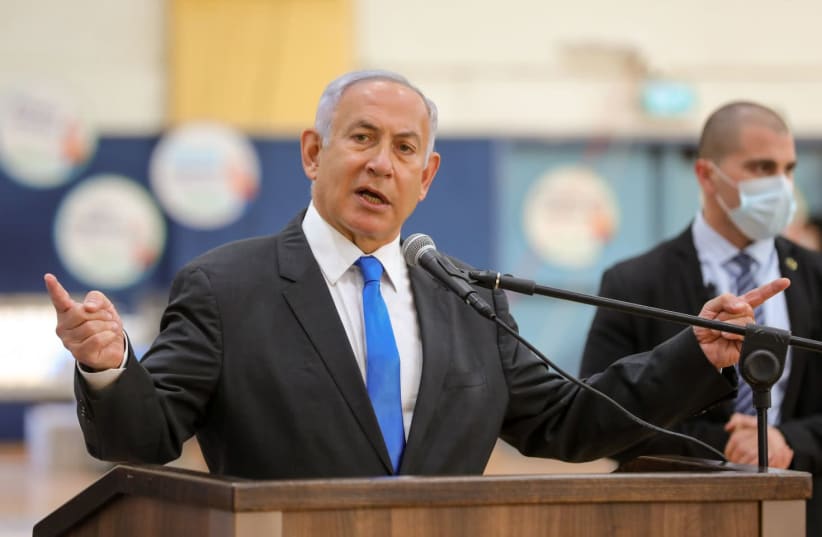Prime Minister Benjamin Netanyahu and the state prosecution continued their fight on Monday over key pieces of evidence as the clock ticked down to the calling of witnesses in his public corruption trial.
The defense filed updated formal motions to dismiss either all of the cases against Netanyahu or large chunks of evidence from those cases based on the claim that Attorney-General Avichai Mandelblit did not properly authorize all aspects of the criminal probes.
In turn, the prosecution said it was too early in the legal proceedings for the defense to challenge the evidence and that Mandelblit properly approved all investigative activities.
Further, the state said even if the court had issues with a small number of activities, this would not justify tossing out large chunks of evidence under Israeli law.
These formal motions extended the verbal bouts between the sides from last week’s hearing before the Jerusalem District Court.
During that hearing, prosecutors Liat Ben Ari and Yehudit Tirosh knocked heads with defense lawyers Boaz Ben Tzur and Amit Hadad over which police investigations Mandelblit had properly approved and for which the police might have gone rogue.
Ben Tzur has maintained that Mandelblit only approved police investigations relating to a separate Bezeq case that will eventually be tried in the Tel Aviv District Court, but not Case 4000.
Hadad has argued that many key activities in Cases 1000 and 2000 lacked approvals from Mandelblit.
One example Hadad has given in which he said Mandelblit had not given proper preapproval led to a sudden new revelation about Yair Netanyahu’s limo driver, Roi Rosen.
In response, the prosecution said the police had questioned Rosen about whether the prime minister’s son had received illegal gifts from Australian billionaire James Packer.
At early stages of Case 1000, the state prosecution and the police were trying to understand how deeply Sarah and Yair Netanyahu were involved in passing on gifts.
It was already known that Sarah Netanyahu was deeply involved in coordinating the receipt of gifts from Israeli billionaire Arnon Milchin.
Part of Case 1000 details how at a later point, Milchin got sick of funding the alleged illegal gifts of expensive champagne and cigars to the Netanyahu family and asked Packer to help with the project.
Packer was questioned about alleged illegal gifts he gave to the Netanyahu family, but Monday was the first revelation of a potential connection between Packer and Yair Netanyahu.
The prosecution explained why the police had questioned Yair Netanyahu’s limo driver after the defense raised the interrogation as having no basis or authority.
On Monday, the prosecution also noted that police had questioned employees at a hotel where Yair Netanyahu had stayed repeatedly, with Milchin or Packer paying the bills.
The prosecution maintained that Mandelblit had approved all of the questioning.
Likewise, Tirosh said Mandelblit had approved investigations of Netanyahu in Case 4000, adding that Ben Tzur was trying disingenuously to separate Bezeq from Netanyahu.
Instead, she said there were three distinct pieces to investigating Bezeq from the start, and one of them always related to Netanyahu.
Prosecutors were trying to understand all along why top Netanyahu aide and then Communications Ministry director-general Shlomo Filber would give Bezeq allegedly illegal favoritism, she said.
These suspicions eventually led Filber to turn against Netanyahu, which led to the explosive media bribery allegations against the prime minister in Case 4000.
However, even if Tirosh is right about the connection between the Bezeq case and Case 4000, Netanyahu’s lawyers said there was no explicit written approval by Mandelblit of investigative actions by the police.
The prosecution admitted that the transcripts of their meetings do not have a formal part where Mandelblit is recorded as explaining why he approved the actions. But they have maintained it is plain from the transcripts of their dozens of meetings on these issues that this is what happened.
Mandelblit issued memoranda after the fact referring to decisions he made at those meetings, they said.
On Monday, the prosecution said these issues can only be raised by the defense once witnesses are called, at which point the state will have the opportunity to fully explain the chronology of the different cases against Netanyahu.
The prosecution is due to send a list of witnesses and trial documents for the trial’s initial stages by March 1.Witnesses are expected to be called by April.
Also on Monday, Netanyahu aides Ofer Golan and Yonatan Orich asked Supreme Court President Esther Hayut to grant them a rare hearing before a broad panel of the court.
On January 26, a three-judge panel of the Supreme Court endorsed the authority of police to access all data on the cellphones of two Netanyahu aides suspected of witness intimidation.
The two allegedly were involved in efforts to intimidate Shlomo Filber, a former top Netanyahu aide turned state’s witness, into dropping his plan to accuse his former boss of corruption.
Generally, broader panels of the Supreme Court are only granted on constitutional issues. But Golan and Orich claim the legality of police accessing their cellphones had not been decided until now, and it has major constitutional implications.
